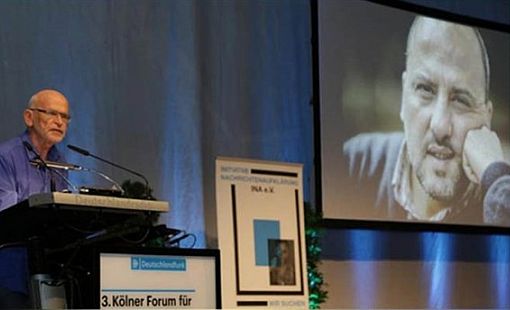Click to read the article in Turkish
Imprisoned journalist Ahmet Şık has been granted Günter Wallraff Critical Journalism Award.
The award organized by Initiative Nachrichtenaufklarung, which was founded to draw attention to stories that are not covered by the mainstream media in Germany, was granted for the third time.
According to a report by Süheyla Kaplan from BirGün daily newspaper, Ahmet Şık’s wife Yonca Şık who attended the ceremony organized in Cologne stated that she met with Ahmet Şık and said “Ahmet said that he was proud of being granted the award”.
Making a speech as to why the award was given to Ahmet Şık, journalist-writer Günter Wallraff said “Ahmet Şık hasn’t given up on uncovering anti-democratic practices and illegalities in Turkey for over 27 years. I am proud of giving this award to Ahmet Şık, who has always sought the truth. He is a journalist I look up to”.
Who is Günter Wallraff
Günter Wallraff (born 1 October 1, 1942 in Burscheid, Rhine Province) is a German writer and undercover journalist.
Wallraff was one of the first people in Germany to invoke his constitutional right not to do armed military service. Despite this refusal, Wallraff was forced to serve time in the Bundeswehr.
Wallraff first took up this kind of investigative journalism in 1969 when he published 13 unerwünschte Reportagen ("13 undesired reports") in which he described what he experienced when acting the parts of an alcoholic, a homeless person, and a worker in a chemicals factory.
He travelled to Greece in May 1974 at the time of the Ioannides military dictatorship. While in Syntagma Square, he protested against human right violations. He was arrested and tortured by the police as he purposely did not carry on him any papers that could identify him as a foreigner. After his identity was revealed, Wallraff was convicted and sentenced to 14 months in jail. He was
Ganz unten ("Lowest of the Low") (1985) documented Wallraff's posing as a Turkish "Gastarbeiter", and the mistreatment he received in that role at the hands of employers, landlords and the German government.
In 1986 he was awarded Laureate of the International Botev Prize.
In January 2003, Russia turned away Wallraff and two other Germans, the former labour minister for the CDU Norbert Blüm and Rupert Neudeck, head of the relief organisation Cap Anamur, as they tried to enter the country to work on a human rights article about Chechnya.
In May 2007, Wallraff announced that he had started yet another undercover journalist work, this time at a German call centre.
During 2009 he wore blackface around Germany in controversial undercover story to expose latent or explicit racism against black men, releasing the documentary "Black on White" to show his experiences. The black author Noah Sow criticized this action: "He imitates oppressed minorities and harvests money, attention and even respect by doing so". As a "painted white" he could not have created real black experiences. According to the Süddeutsche Zeitung, the method itself would be racist.
His investigative methods have led to the creation of the Swedish verb 'wallraffa' meaning "to expose misconduct from the inside by assuming a role". The word is currently included in the dictionary Svenska Akademiens Ordlista. (NV/ÇT/TK)






